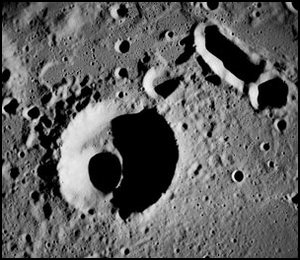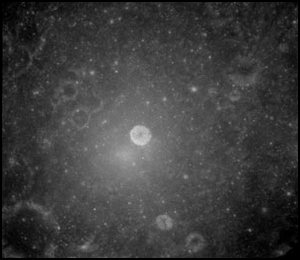-
 Mike Collins (CAPCOM)
Mike Collins (CAPCOM)
-
People listening to the high bit rate down here say it's like sitting in your living room listening to good hi-fi.
-
 Mike Collins (CAPCOM)
Mike Collins (CAPCOM)
-
Apollo 8, Houston. Coming up on 2 minutes to LOS. We got a good reservice on the primary evaporator, and everything is still looking very good down here.
-
 Mike Collins (CAPCOM)
Mike Collins (CAPCOM)
-
Apollo 8, Houston. One minute to LOS. Are you still reading us loud and clear?
-
 Mike Collins (CAPCOM)
Mike Collins (CAPCOM)
-
Okay, fine. We've been noticing a little bit of increase in our background noise as you approach backside.
-
 Bill Anders (LMP)
Bill Anders (LMP)
-
Roger. Looks like the evaporator—looks like the evaporator is holding okay, or at least it is trying to. It dropped the temperature down to about 32, and now it's come back up again and stabilized at about 42 degrees.
-
 Jim Lovell (CMP)
Jim Lovell (CMP)
-
Roger. Houston, this is Apollo 8. What we are doing on the control point tracking—I managed to look for a CP-1 at the same time we were trying to do a CP-2 on this rev. I picked up two marks which are just as small, but more easily recognizable, than the ones that were given to me. I know that I can repeat the process and pick the same small point on the next rev. Now I can try to look for the control points that are written down, but I think that I have better control over the ones that we have.
-
 Jim Lovell (CMP)
Jim Lovell (CMP)
-
Roger. One more point: the control point times which you have given me are a little bit off, and I can notice by comparing these maps that these maps are not too well aligned either.
-
 Mike Collins (CAPCOM)
Mike Collins (CAPCOM)
-
Roger. These two small points that you can repeat your marks on: will you be able to identify those precisely on a map? Over.
-
 Jim Lovell (CMP)
Jim Lovell (CMP)
-
That's affirmative; that is why I picked them. They are both—they're both very prominent features, and they are both very small craters about the same size as the ones we are looking for, but I can pinpoint them on a map.
-
 Jim Lovell (CMP)
Jim Lovell (CMP)
-
Roger. One more comment: as it offered a lot of controversy at data priority meetings, it looks like 10 degrees pitch up is the best attitude to obtain the horizon so that you can follow the landmark down through the scanning telescope. If you pitch down any more, full up trunnion will not get the horizon, and the horizon is a great help in leading yourself into the control point.
-
 Mike Collins (CAPCOM)
Mike Collins (CAPCOM)
-
Apollo 8, Houston.
Expand selection down Contract selection up -
 Mike Collins (CAPCOM)
Mike Collins (CAPCOM)
-
Jim, we concur with your use of the two small craters which you can repeatedly mark on and find on the map; and also if you will give us your new latitudes and longitudes, we can compute for you a time of closest approach to those points with the spacecraft 10 degrees pitched-up. Over.
-
 Jim Lovell (CMP)
Jim Lovell (CMP)
-
Roger, Houston. CP-1 latitude minus 606269, longitude over 2, minus 78954, altitude plus 00152; for CP-2 latitude minus 09638, longitude over 2, plus 81691, altitude minus 00007. I tried to get CP-3 at the same pass, but I let it go by to get set up for this first track at the landing site.
-
 Mike Collins (CAPCOM)
Mike Collins (CAPCOM)
-
Roger, Houston. CP-1: would you say again the latitude, and on CP-2, say again the longitude CP-2, please?
-
 Jim Lovell (CMP)
Jim Lovell (CMP)
-
Roger. CP-1 latitude minus 06269; that is the latitude; and for longitude over 2 for CP-2, plus 81691.
-
 Jim Lovell (CMP)
Jim Lovell (CMP)
-
And it appears so far, Houston, that no spacecraft pitch motion is required to get five marks on the target in plenty of time.
-
 Mike Collins (CAPCOM)
Mike Collins (CAPCOM)
-
Roger. I am about 15 minutes early with the TEI fix update and the map update. I will have them here whenever it's convenient for you to copy.
-
 Mike Collins (CAPCOM)
Mike Collins (CAPCOM)
-
Roger. We would like to ask you to stop using AUTO OPTICS on the pseudo landing site. It's necessary that we send you up a P27 to update the RLS values stored in the computer. Over.
Spoken on Dec. 24, 1968, 6:41 p.m. UTC (55 years, 10 months ago). Link to this transcript range is: Tweet


